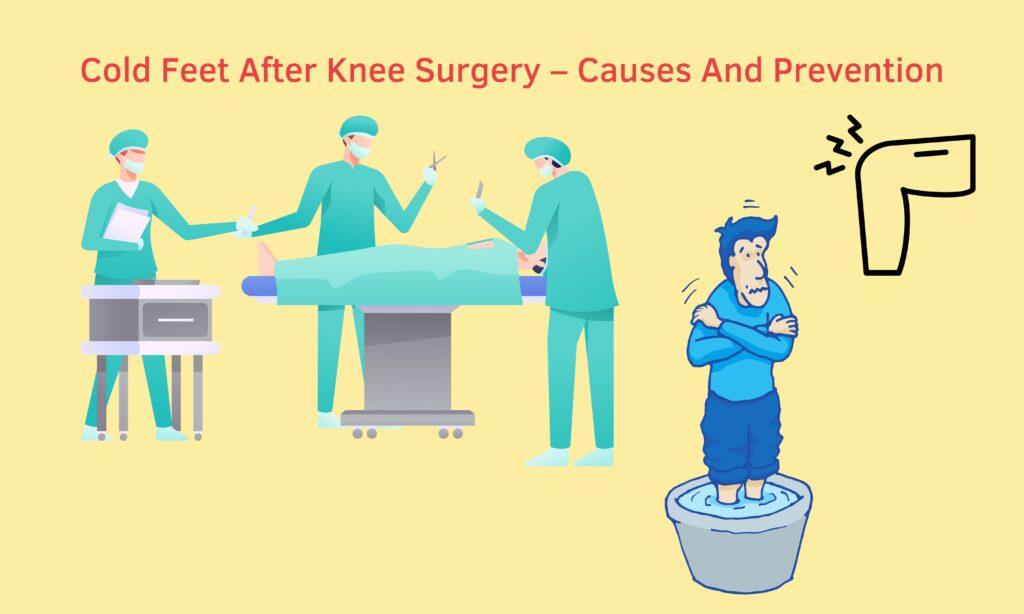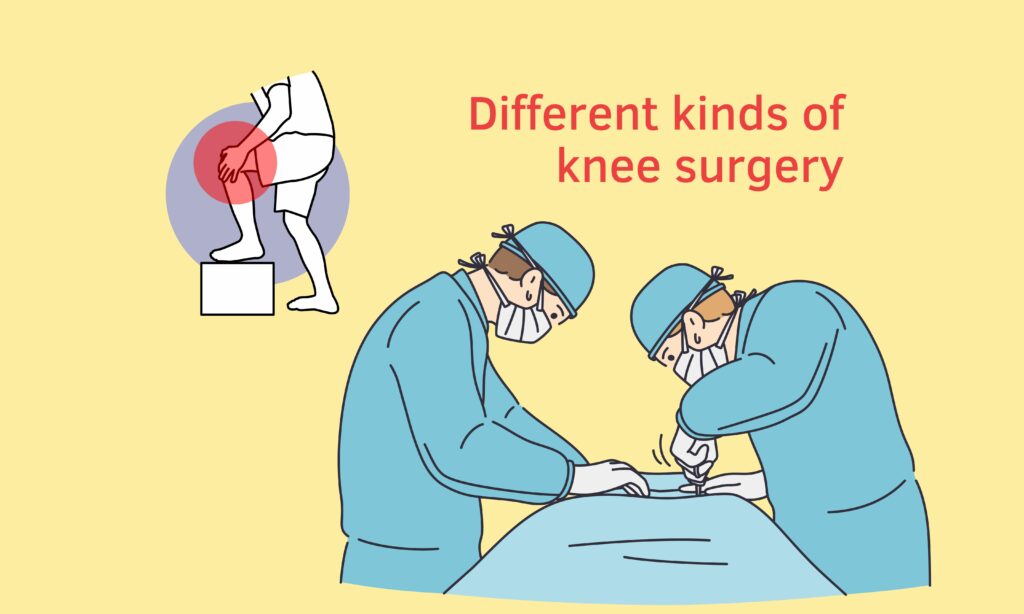
Cold feet after knee surgery is a common concern among patients. This sensation is characterized by the feet feeling cold to the touch or numbness in the feet. While it may seem unrelated to the knee surgery, it is actually a result of the surgical procedure. Understanding the causes and prevention of cold feet after knee surgery can help patients manage their symptoms and speed up their recovery.
- Nerve damage – One of the primary causes of cold feet after knee surgery is nerve damage. During the surgical procedure, the nerves in the leg can be damaged or disrupted, leading to a variety of sensations, including cold feet. In addition, the use of anesthesia during the surgery can also contribute to nerve damage, which can lead to cold feet after the surgery.
- Poor circulation – Another cause of cold feet after knee surgery is poor circulation. The surgery can cause swelling and inflammation in the leg, which can put pressure on blood vessels, restricting the flow of blood to the feet. As a result, the feet may feel cold and numb due to the lack of blood flow.
To prevent cold feet after knee surgery, patients can take a few precautions. First, it is important to stay active after the surgery, as this can help improve blood flow and prevent swelling. Patients should follow the rehabilitation program prescribed by their doctor, which typically involves exercises and physical therapy to help improve circulation.
- Healthy weight – Another way to prevent cold feet after knee surgery is to maintain a healthy weight. Being overweight or obese can increase the risk of complications after surgery, including poor circulation, which can lead to cold feet. Patients should follow a healthy diet and exercise regularly to maintain a healthy weight and reduce their risk of complications.
In conclusion, cold feet after knee surgery is a common concern among patients, but it can be managed and prevented. Understanding the causes of cold feet after knee surgery, such as nerve damage and poor circulation, can help patients take steps to prevent this sensation from occurring. By staying active, maintaining a healthy weight, and following the rehabilitation program prescribed by their doctor, patients can reduce their risk of complications and speed up their recovery.
Cold feet after knee surgery
Cold feet after knee surgery is a common occurrence that affects many patients. It is a sensation characterized by the feet feeling cold to the touch, and it can be quite discomforting. While it may seem unrelated to the knee surgery, it is actually a result of the surgical procedure. Understanding the causes of cold feet after knee surgery can help patients manage their symptoms and speed up their recovery.
One of the primary causes of cold feet after knee surgery is nerve damage. During the surgical procedure, the nerves in the leg can be damaged or disrupted, leading to a variety of sensations, including cold feet. The use of anesthesia during the surgery can also contribute to nerve damage, which can lead to cold feet after the surgery.
Another cause of cold feet after knee surgery is poor circulation. The surgery can cause swelling and inflammation in the leg, which can put pressure on blood vessels, restricting the flow of blood to the feet. As a result, the feet may feel cold and numb due to the lack of blood flow. This can be quite discomforting for patients and can make it difficult to walk or move around.
To prevent cold feet after knee surgery, patients can take a few precautions. It is important to stay active after the surgery, as this can help improve blood flow and prevent swelling. Patients should follow the rehabilitation program prescribed by their doctor, which typically involves exercises and physical therapy to help improve circulation. This can also help prevent nerve damage and reduce the risk of complications.
Another way to prevent cold feet after knee surgery is to wear compression stockings. These stockings can help improve blood flow and prevent swelling, which can reduce the risk of cold feet. They are typically worn for several weeks after the surgery and can help patients feel more comfortable and reduce their risk of complications.
In conclusion, cold feet after knee surgery is a common concern among patients, but it can be managed and prevented. Understanding the causes of cold feet after knee surgery, such as nerve damage and poor circulation, can help patients take steps to prevent this sensation from occurring. By staying active, wearing compression stockings, and following the rehabilitation program prescribed by their doctor, patients can reduce their risk of complications and speed up their recovery. It is important for patients to communicate with their healthcare provider about any concerns they may have during their recovery process.
How to avoid cold feet after knee surgery?

Cold feet after knee surgery is a common concern for patients who undergo knee surgery. It is a sensation that is characterized by the feet feeling cold to the touch, and it can be quite discomforting. However, there are several things that patients can do to avoid cold feet after knee surgery and help speed up their recovery.
- One of the primary causes of cold feet after knee surgery is poor circulation. To avoid this, patients can do some exercises to improve blood flow to their feet. Walking and moving around are great ways to get the blood flowing and improve circulation. Patients can also try some simple exercises, such as ankle pumps and toe raises, which can help improve blood flow to the feet.
- Another way to avoid cold feet after knee surgery is to elevate the legs. This can help reduce swelling and improve blood flow to the feet. Patients should keep their legs elevated whenever possible, and they can use pillows or a footrest to keep their legs elevated when they are sitting or lying down.
- Wearing compression stockings is another way to avoid cold feet after knee surgery. These stockings can help improve blood flow and prevent swelling, which can reduce the risk of cold feet. Patients should wear compression stockings as recommended by their doctor, usually for several weeks after the surgery.
- It is also important for patients to stay hydrated after knee surgery. Drinking plenty of water can help improve blood flow and reduce the risk of complications. Patients should also avoid smoking and limit their alcohol intake, as both of these can affect blood flow and slow down the healing process.
- In addition, patients should follow the rehabilitation program prescribed by their doctor. This may involve physical therapy, exercises, and stretching to help improve circulation and reduce the risk of complications. Patients should communicate with their healthcare provider about any concerns they may have during their recovery process.
In conclusion, there are several ways that patients can avoid cold feet after knee surgery. By improving blood flow, elevating the legs, wearing compression stockings, staying hydrated, and following the rehabilitation program prescribed by their doctor, patients can reduce their risk of complications and speed up their recovery. It is important for patients to communicate with their healthcare provider about any concerns they may have during their recovery process.
Different kinds of knee surgery

Knee surgery is a common procedure that is used to treat a variety of conditions, such as injuries, arthritis, and other knee-related conditions. There are several types of knee surgery, and each type is designed to address specific issues. Regardless of the type of surgery, patients may experience discomforts such as cold foot after knee surgery. In this article, we will explore different kinds of knee surgery.
1.Total knee replacement surgery
Total knee replacement surgery is one of the most common types of knee surgery. This surgery is typically recommended for patients with severe arthritis or other knee-related conditions that have not responded to other treatments. During this surgery, the entire knee joint is replaced with an artificial joint, which can help reduce pain and improve mobility. Patients may experience cold foot after knee surgery as a result of the surgery.
2.Partial knee replacement surgery
Partial knee replacement surgery is another type of knee surgery. This surgery is used to replace only a portion of the knee joint, rather than the entire joint. This type of surgery is typically recommended for patients who have arthritis or other knee-related conditions that are limited to one area of the knee. Patients who undergo this surgery may also experience cold foot after knee surgery.
3.Arthroscopic knee surgery
Arthroscopic knee surgery is a minimally invasive surgical procedure that is used to diagnose and treat knee-related conditions. During this surgery, a small incision is made in the knee, and a tiny camera is inserted to provide a view of the inside of the knee. This type of surgery can be used to repair damaged cartilage, ligaments, and other structures in the knee. Patients who undergo this surgery typically experience a faster recovery time and may be less likely to experience cold foot after knee surgery.
4.Knee ligament repair surgery
Knee ligament repair surgery is another type of knee surgery that is used to repair damaged ligaments in the knee. This type of surgery is typically recommended for patients who have torn their anterior cruciate ligament (ACL) or other knee ligaments. During this surgery, the damaged ligament is replaced with a graft from another part of the body or a donor. Patients may experience cold foot after knee surgery as a result of this procedure.
In conclusion, there are several types of knee surgery that are used to treat a variety of knee-related conditions. Regardless of the type of surgery, patients may experience cold foot after knee surgery. It is important for patients to communicate with their healthcare provider about any concerns they may have during their recovery process. By following the rehabilitation program prescribed by their doctor and taking necessary precautions, patients can reduce their risk of complications and speed up their recovery.
FAQs
Patients who undergo knee surgery may have several questions regarding the procedure, recovery process, and potential complications. In this article, we will answer some of the frequently asked questions about knee surgery, including the common concern of cold foot after knee surgery.
Q: What causes cold foot after knee surgery?
A: Cold foot after knee surgery can be caused by poor circulation, swelling, or nerve damage. It is a common concern for patients who undergo knee surgery, but it is usually temporary and can be managed with proper care and precautions.
Q: How long does it take to recover from knee surgery?
A: Recovery time from knee surgery varies depending on the type of surgery, the patient’s age and overall health, and other factors. In general, it can take several weeks to several months for patients to fully recover and regain their mobility and strength.
Q: What should I do if I experience cold foot after knee surgery?
A: If you experience cold foot after knee surgery, you should speak with your healthcare provider. They may recommend exercises to improve circulation, compression stockings to reduce swelling, or other treatments to help manage the discomfort.
Q: What can I do to speed up my recovery after knee surgery?
A: To speed up your recovery after knee surgery, you should follow your doctor’s instructions and rehabilitation program. This may include exercises, physical therapy, and other treatments to help you regain your mobility and strength.
Q: Are there any complications associated with knee surgery?
A: Like any surgical procedure, knee surgery can have potential complications, such as infection, blood clots, and nerve damage. However, these complications are rare, and most patients have a successful and uneventful recovery.
In conclusion, knee surgery can be a beneficial treatment option for patients with knee-related conditions. Although there may be concerns such as cold foot after knee surgery, most patients have a successful recovery with proper care and precautions. Patients should communicate with their healthcare provider about any questions or concerns they may have regarding knee surgery or their recovery process.
To summarize
In summary, knee surgery is a common procedure used to treat a variety of knee-related conditions. Patients may experience discomforts such as swelling, pain, and cold foot after knee surgery. However, most patients have a successful recovery with proper care and precautions.
Total knee replacement surgery is one of the most common types of knee surgery. This surgery can help reduce pain and improve mobility by replacing the entire knee joint with an artificial joint. Partial knee replacement surgery is another type of knee surgery that replaces only a portion of the knee joint. Arthroscopic knee surgery and knee ligament repair surgery are other types of knee surgery used to treat knee-related conditions.
Recovery time from knee surgery varies depending on the type of surgery, the patient’s age and overall health, and other factors. Patients should follow their doctor’s instructions and rehabilitation program to speed up their recovery and regain their mobility and strength.
Cold foot after knee surgery is a common concern for patients who undergo knee surgery. It can be caused by poor circulation, swelling, or nerve damage. Patients should speak with their healthcare provider if they experience cold foot after knee surgery. They may recommend exercises, compression stockings, or other treatments to help manage the discomfort.
Although knee surgery can have potential complications, such as infection, blood clots, and nerve damage, these complications are rare. Most patients have a successful and uneventful recovery. Patients should communicate with their healthcare provider about any questions or concerns they may have regarding knee surgery or their recovery process.
In conclusion, knee surgery can be a beneficial treatment option for patients with knee-related conditions. Patients should take necessary precautions and follow their doctor’s instructions to ensure a successful recovery. If they experience any discomforts, such as cold foot after knee surgery, they should communicate with their healthcare provider to manage the discomfort effectively.